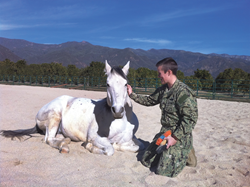“Lone Survivor” Retreats Use Healing Power of Horses to Help Military Vets Suffering From PTSD
New Data on Lone Survivor Foundation’s Retreat Program Show Significantly Reduced PTSD Effects for Post 9/11 Service Members, Veterans and Their Families
Lone Survivor Foundation press release
The long-term grind of Operations New Dawn, Iraqi Freedom and Enduring Freedom has exacted a profound emotional and physical toll that has strained both our service members’ resilience and the capacity and effectiveness of the systems that serve them.
The reality is that many service people perceive traditional, office-based “talk therapy” as ineffective, or worse, stigmatizing. This kind of treatment – no matter how skillful or well-intentioned the clinical practitioner – can feel passive and collide head-on with the culture and values of military people.
The big challenge is to provide measurably effective treatment for the one-out-of-every-five veterans experiencing post-traumatic stress as they transition to life back home. To increase the likelihood that this treatment is, in fact, measurably effective, it must be engaging, hands-on and emotionally safe. It should not stigmatize or marginalize. And it must connect in a genuine way with the culture and mindset of the people it’s designed to help heal.
After losing three buddies and nearly his life in Afghanistan on June 27, 2005, Hospital Corpsman First Class Marcus Luttrell returned home to the solitude and support of his Texas ranch to heal, with a Purple Heart, a Navy Cross and a deep understanding of what it means to be a lone survivor.
He turned his story into the 2007 New York Times number one bestseller: Lone Survivor: The Eyewitness Account of Operation Red Wings and Lost Heroes of SEAL Team 10 – a book that would go on to become the 2013 hit film Lone Survivor, starring Mark Wahlberg.
The Lone Survivor Retreat: Bringing together two innovative and proven treatments
The healing power of horses…
Marcus set up the Lone Survivor Foundation in 2010 to offer his fellow survivors and their families the opportunity for a healing experience similar to his own at his ranch. It was this ranch experience that taught Marcus the healing value of being with horses in a peaceful setting.
To turn Marcus’ vision into an effective program, Denise Grant, Lone Survivor’s military-experienced mental health professional and program manager, brought together key components she knew would work synergistically to achieve the strongest results during a retreat. Her combination of psycho-education, injury insight, practical coping skills and rapid traumatic stress reduction has become the Lone Survivor retreat model.
It has been the combination of these learning and growth techniques, under the guidance of professionals with a keen understanding of the ways trauma and military culture intersect, that’s created success.
With equine-assisted therapy as a core element of the program, Grant chose The EAGALA Model, with which she had strong professional familiarity as the most effective vehicle for imparting practical life lessons during the retreat. The EAGALA Model of equine assisted personal development is an exclusive treatment protocol offered by the 4,200-member Equine Assisted Growth and Learning Association.
According to Grant: “I knew the power of The EAGALA Model would be the right approach to help put our retreat participants on the right path for change.”
In The EAGALA Model, the client works on the ground face-to-face with the horses in the stable under the direction of the treatment team. The horses serve as powerful living metaphors and stand-ins for the people, issues and challenges in their lives, or the lives of the couple, family or military unit.
Horses can help people understand themselves more deeply. They have a special capacity to read and respond to peoples’ non-verbal signals and cues. If the client is anxious or angry, horses can sense it and react. They are non-judgmental and offer an unfiltered, non-threatening reflection of the client’s inner emotional state. They offer this without stigma or shame. And that’s why the hands-on, fully engaging work made possible by equine assisted psychotherapy and The EAGALA Model leads to powerful emotional breakthroughs and life-changing insights.
EAGALA is the only association of equine-assisted psychotherapists and trainers that requires a licensed, credentialed mental health practitioner and a certified equine specialist to collaboratively lead the treatment at all times. It is also the only association of its kind with its own special Military Services Designation, which adds additional military-grounded experience and training requirements, beyond the standard EAGALA credentialing, for members who want to work primarily with military clients.
The healing experience for military personnel, veterans and their families in a corral or stable is deliberately very different from anything they would experience in a traditional treatment setting, assuming they would even put themselves in a traditional setting. And it’s this essential difference – this safe harbor – that makes the program uniquely effective… and rewriting the trauma script.
The other key component of the three-day Lone Survivor retreats is a series of daily, one-on-one sessions designed to help participants reimagine their traumatic experiences, remove the toxic power of these experiences, and replace the traumatic mental images with more positive images using an evidence-based, professionally-reviewed technique known as Accelerated Resolution Therapy (ART).
Accelerated Resolution Therapy utilizes all four fundamental components – narrative, imaginal exposure, cognitive restructuring and stress reduction – recognized by the U.S. Department of Veterans Affairs as necessary for treating major (Criterion A) trauma. ART is well-studied with outcomes published in five publications, including twice in the prestigious journal Military Medicine.
During these sessions with a trained therapist, the client first “imagines” the traumatic events and experiences that haunt her or him, much like viewing an internal film. As this happens, the therapist tracks the physical changes – sweating, rapid breathing, etc. – that emerge as the traumatic experience is relived, and utilizes bilateral eye movement exercises and deep relaxation techniques to reduce their power. The client is then guided to replace the original traumatizing images with positive images and sensations in a process called voluntary image replacement.
Over time, ART displaces the power of the traumatic event by neurologically reprogramming the experience in the client’s brain and replacing the imagery with better scenarios. This reimagining process means that the power of the event to continue to traumatize diminishes over time due to the creation of a new neurological script, without any loss of the ability to recall the actual facts of the trauma, in case recall is necessary.
Treatment Outcomes Can Literally Be a Matter of Life and Death
The retreats have, in the words of the military clients and their families, been an unequivocally moving experience. But the larger questions are: Have they reduced the effects of trauma and helped participants better understand how trauma plays out in their lives? And, have they put people on a long-term healing path?
In a word, yes.
The US Departments of Defense and Veterans Affairs use a testing instrument known as the PCL-M (the Posttraumatic Stress Disorder Checklist [Military]) to determine the degree to which active duty personnel and veterans are suffering from posttraumatic stress and the ways that stress emerges as symptoms. This 17-question evaluation is considered a critical benchmark for determining if a warrior is suffering the effects of trauma and how those effects are making themselves felt in his or her life through nightmares, isolation, and rage.
Just as critically, the PCL-M can measure the impact of particular treatments and interventions over time. By testing participants both before and after a treatment or intervention, it’s possible to learn if post-traumatic stress levels changed and how that change translates into behavior.
The Lone Survivor Foundation pre-tests and post-tests all its retreat participants using the PCL-M and three other measurement tools to get a comprehensive inventory of their trauma level, overall mental health, anxiety and physical pain.
Kevin E. Kip, PhD, executive director of the University of South Florida College of Nursing Research Center, is an expert in the scientific study of factors affecting the health and illness of populations, and is responsible for overseeing the data collection and analysis of the treatment outcomes data collected from participants in the Lone Survivor retreats.
Analyzing the pre and post-test data collected from 66 active military and veteran participants in monthly Lone Survivor retreats held over a one year period, Kip found a very strong, clinically significant average reduction in trauma effects following the retreats. Participants scored a mean of 58.7 on the PCL-M prior to the retreat. Afterward, their score averaged 40.5, a strong 18.2 reduction in trauma. By PCL-M standards, any change greater than 10 is considered clinically significant.
According to Kip: “Lone Survivor’s data is strong and compelling and shows clinically significant trauma reduction among participating active duty military and veterans. Their innovative linkage of EAGALA equine-assisted learning and Accelerated Resolution Therapy – both rooted in the use of metaphors – is clearly having a synergistic healing effect in decreasing the impact of trauma while increasing participants’ overall sense of well-being.”
The Next Step: Expand on a Proven Success
With strong data as a starting point, Lone Survivor Foundation, EAGALA and the University of South Florida will be seeking support to further develop and expand the capacity of their proven treatment model.
Plans call to provide additional facilities to conduct more retreats as well as the establishment of a network of EAGALA and ART-certified mental health professionals to provide continuity of care and follow-up for retreat participants to make certain that treatment success gets “locked in.”
Terry Jung, executive director of the Lone Star Foundation, characterized the opportunity this way: “Our military and their families deserve trauma-treatment programs that engage them on their own unique terms and deliver measurable healing results. Our program is doing that. Now, we’re teaming with our partners, EAGALA and the University of South Florida, to take it to the next level.”











